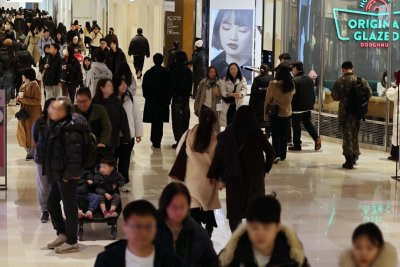North Korea’s Kim Jong Un sets stage for daughter as his successor: Seoul | Kim Jong Un News
Little is known about Kim’s daughter, Ju Ae, who made her first public appearance in 2022 but appears set to be her father’s successor.
Published On 12 Feb 2026
South Korea’s spy agency believes that North Korean leader Kim Jong Un is preparing to designate his daughter, Kim Ju Ae, as his successor, increasing the agency’s earlier assessment of the teenager being the “most likely successor”.
The National Intelligence Service in Seoul informed legislators of the news during a closed-door briefing on Thursday, according to South Korea’s official Yonhap News Agency. Their intelligence agency’s findings were later shared with the media by South Korean politicians Park Seon-won and Lee Seong-gwon.
Recommended Stories
list of 4 itemsend of list
“Kim Ju Ae’s presence continues to be highlighted at events such as the recent Armed Forces Day ceremony and her visit to the Kumsusan Palace of the Sun, and there are even signs that she is expressing opinions on some policies,” Lee told reporters, according to Yonhap.
“We believe that she has now entered the succession selection stage,” Lee said.
Kumsusan Palace of the Sun is considered one of the most important places in North Korea as the final resting place of the country’s Great Leader Kim Il Sung and his son Dear Leader Kim Jong Il – the current Kim’s grandfather and father, and Ju Ae’s great-grandfather and grandfather.

Yonhap reports that if Ju Ae attends or receives a title at the ruling Workers’ Party congress later this month, a key political event that analysts believe will see major policy goals unveiled, speculation about her path to succession will “gain traction”.
Very little is known about Kim’s daughter, including her official age, though she is believed to still be in her teens.
Her first public appearance was in 2022 at the test launch of a North Korean intercontinental ballistic missile, and she has been photographed alongside her father at numerous events across the country since then.
In January, she was photographed by Pyongyang’s Korean Central News Agency attending the test launch of a large-calibre multiple-rocket launch system alongside her father.
She also travelled by armour-plated train with her father to Beijing in September to attend a military parade marking 80 years since Japan’s surrender at the end of World War II, where she would have mixed with both Chinese and Russian leaders.
Seoul’s spy agency also said that Kim is currently directing the development of a large submarine that is likely capable of carrying up to 10 submarine-launched ballistic missiles and which may be designed to be powered by a nuclear reactor, according to the politicians Park and Lee.







